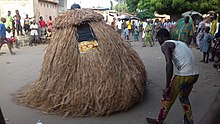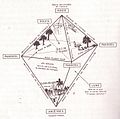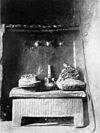Introduction The beliefs and practices of African people are highly diverse, including various ethnic religions. Generally, these traditions are oral rather than scriptural and are passed down from one generation to another through folk tales, songs, and festivals, and include beliefs in spirits and higher and lower gods, sometimes including a supreme being, as well as the veneration of the dead, and use of magic and traditional African medicine. Most religions can be described as animistic with various polytheistic and pantheistic aspects. The role of humanity is generally seen as one of harmonizing nature with the supernatural. (Full article...) Selected articleÒrìṣà (original spelling in the Yoruba language), known as orichá or orixá in Latin America, are the human form of the spirits (Irunmọlẹ) sent by Olodumare, Olorun, Olofi in Yoruba traditional identity. The Irunmọlẹ are meant to guide creation and particularly humanity on how to live and succeed on Earth (Ayé). Most Òrìṣà are said to be deities previously existing in the spirit world (Òrun) as Irunmọlẹ, while others are said to be humans who are recognized as deities upon their deaths due to extraordinary feats. Many Òrìṣà have found their way to most of the New World as a result of the Atlantic slave trade and are now expressed in practices as varied as Santería, Candomblé, Trinidad Orisha, Umbanda, and Oyotunji, among others. The concept of orisha is similar to those of deities in the traditional religions of the Bini people of Edo State in southern Nigeria, the Ewe people of Benin, Ghana, and Togo, and the Fon people of Benin. Selected imagesFestivalsThere are several religious festivals found in the various Traditional African religions. Some of these are listed below next to their corresponding religion :
Selected biography
The King of Oussouye is a religious, spiritual and traditional leader of the Jola people who follow their traditional religion. The Jolas believe in a god called Ata Emit. The King is an intermediary between God and men. The king is described as a "collaborator of God who receives offerings to pray and intercede with the spirits".
Selected quote
Roger S. Gottlieb Source: Gottlieb, Roger S., The Oxford Handbook of Religion and Ecology, Oxford University Press (2006), p. 261, ISBN 9780199727698 [1]
Did you know
Related portalsTopicsFor more Traditional African religion topics, see Category:Traditional African religions.
CategoriesWikiProjectsThings you can doAssociated WikimediaThe following Wikimedia Foundation sister projects provide more on this subject:
Discover Wikipedia using portals |
© MMXXIII Rich X Search. We shall prevail. All rights reserved. Rich X Search






































